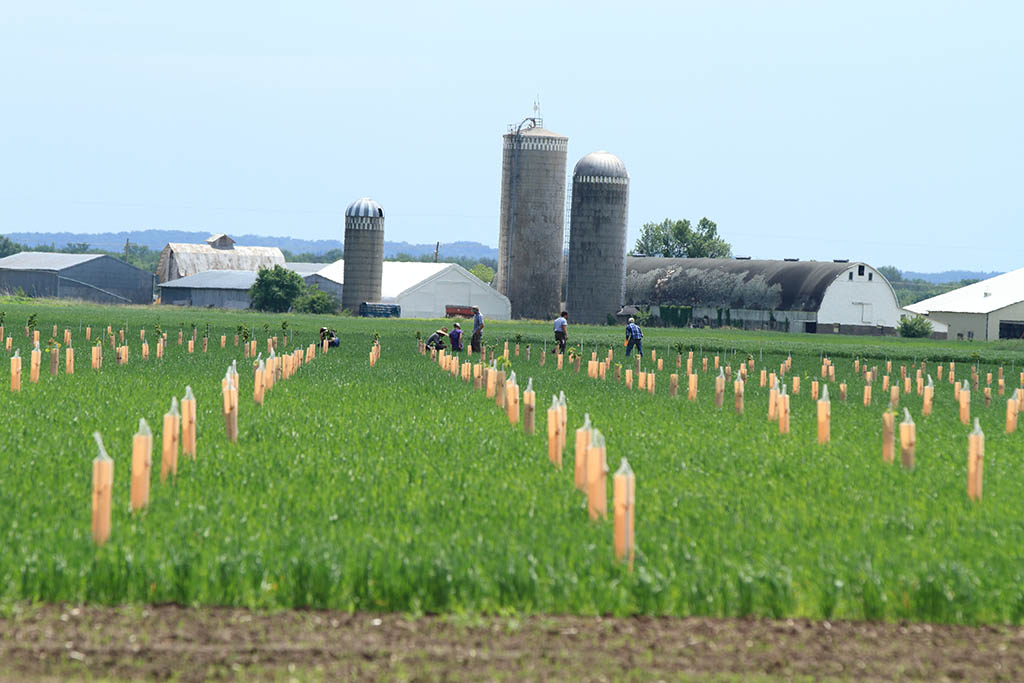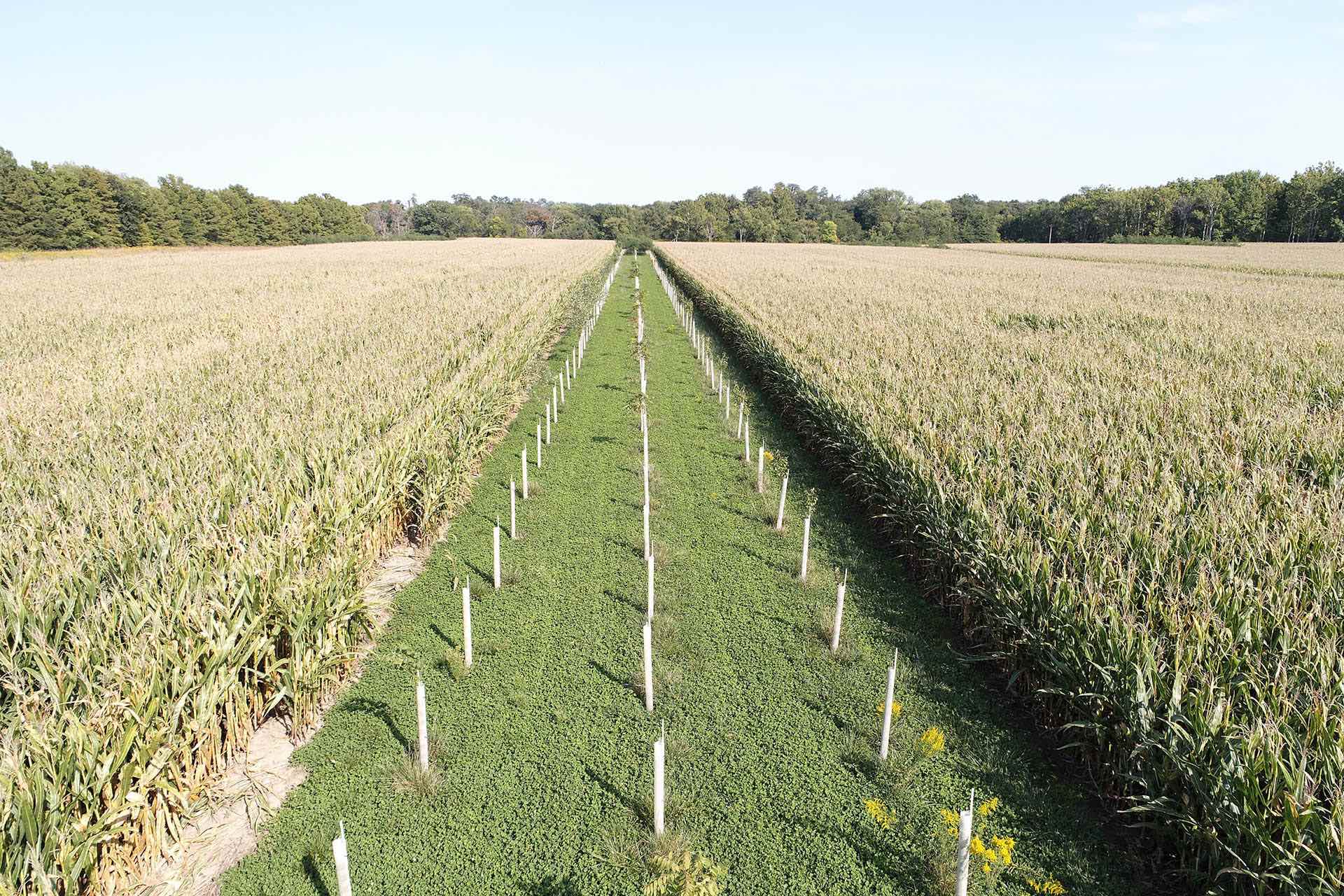Savanna Institute, Grantham Environmental Trust launch Canopy Farm Management to unlock Midwestern agriculture as a natural climate solution
For Immediate Release
January 25th, 2022
Press Contacts:
Keefe Keeley
Savanna Institute
[email protected]
www.SavannaInstitute.org
(608) 448-6432 ext. 100
Kevin Wolz
Canopy Farm Management
[email protected]
www.CanopyFM.com
(608) 448-6432 ext. 101
MADISON, WI — A newly launched business, Canopy Farm Management (“Canopy”), will unlock the potential for Midwestern agriculture to become a natural climate solution, filling a key gap in an emerging industry in the region. The company represents an innovative partnership between the Savanna Institute and the Grantham Environmental Trust. With initial hubs in Illinois and Wisconsin, Canopy will focus on tree planting and management for farmers and landowners.
Integrating trees into the agricultural landscape — “agroforestry” — has the potential to sequester more carbon than any other agricultural land management practice. Agroforestry includes field-edge practices such as windbreaks and riparian buffers, as well as practices that more directly integrate trees with row crops (alley cropping) or livestock (silvopasture). When integrated into these systems, emerging tree crops like hazelnuts and chestnuts have the potential to introduce new income sources for local farmers and bring new investment to the region. Hazelnuts, for example, represent a $7 billion global market set to double in the next decade.
Canopy occupies a key juncture in this emerging industry, providing expertise and technology for tree planting, management, and harvesting. Without Canopy’s capacity and resources, many farmers who are interested in planting trees for conservation purposes or to engage new markets have not been able to take those steps.
An Innovative Partnership
Launching Canopy has been a years-long, multi-organization effort of planning and development. Canopy represents an innovative partnership between a 501(c)(3) nonprofit dedicated to scaling up agroforestry, the Savanna Institute, and impact investors, which have contributed $5M to launch the company’s operations. Initial investors include the Grantham Environmental Trust and a Chicago-based impact investor.
The partnership expects Canopy to catalyze more for-profit businesses to move into perennial agriculture by demonstrating market demand for its services. The majority of Canopy’s profits will go to non-profit entities supporting the widespread adoption of agroforestry and other natural climate solutions in the US. The Savanna Institute, as a part-owner of the company, will be one of those beneficiaries. The remaining profits will be shared among Canopy employees.
“Canopy will be working towards the same vision as the Savanna Institute. With the unique strengths of a business, Canopy is built to help people succeed in adding more trees to their farms,” said Keefe Keeley, Executive Director of the Savanna Institute.
About Canopy Farm Management
Canopy will provide tree planting and management services to farmers and landowners in the Midwest. Canopy will establish perennial crops, timber plantings, conservation practices, and integrated agroforestry systems. Its approach will combine expert staff, thoughtful design, and a mobile fleet of state-of-the-art farm equipment to cost-effectively establish and manage profitable, diverse, and resilient agroecological systems. Canopy is launching with seven staff and two hubs: in Champaign, IL and Spring Green, WI.
Canopy will also operate a perennial-focused plant nursery to expand the supply of cost-effective plant material in the region. The nursery will emphasize productive tree crops such as chestnut, hazelnut, heartnut, walnut, pecan, persimmon, pawpaw, black currant, and elderberry.
Kevin Wolz will lead Canopy as its CEO, stepping down from his current position as co-Executive Director of the Savanna Institute in the process. Wolz, who was previously founding Chair of the Savanna Institute’s Board of Directors from 2013-2016, had served as co-Executive Director since 2017 alongside Keefe Keeley. Keeley, who has led the Savanna Institute since 2014, will continue as Executive Director.
Wolz said: “Canopy will support Midwestern farmers and landowners as we all work to stimulate Midwestern agriculture with profitable perennial crops and effective conservation strategies. We want to enable a second story for every farm.”
###
About the Savanna Institute
The Savanna Institute is a 501(c)(3) nonprofit organization that works with farmers and scientists to lay the groundwork for widespread agroforestry adoption in the Midwest US. The Institute conducts research, education, and outreach to support the growth of diverse, perennial agroecosystems.
About the Grantham Environmental Trust
The Jeremy and Hannelore Grantham Environmental Trust invests to redesign energy systems, improve soil health, spare the ocean from acidification, and directly recapture carbon from the atmosphere. The Grantham Environmental Trust and its affiliate, the Grantham Foundation for the Protection of the Environment, have, for over 15 years, focused almost exclusively on climate change mitigation and currently support over eighty grantees and forty portfolio companies around the world.
Jacob Grace: Part of why I get very hesitant about claims that ‘if you do a certain practice, it will sequester X amount of carbon’ is because it seems like it depends a lot on where you are and what has happened on that land in the past.
Monika Shea: It’s really, really important to consider not just regional differences in soils and climate, but fine scale, like landscape differences. Even on your farm, there’s differences in microclimates and how that’s going to affect growth. And all of those things act together to affect that overall carbon sequestration number. And so that’s why it’s really hard to nail down a number.
People really want to have a number to say, you know, ‘chestnuts sequester this much carbon’. And it would be so lovely to have a number to give to people! But it’s like, are we talking about growing chestnuts on mollisols or alfisols? What’s the pH? Is the drainage good? Are you growing it in zone five or zone eight? All those things really play a role.
Nate Lawrence: Of course carbon outcomes are going to be variable. Everything in biology and ecology is variable. So if a hundred farmers adopt a practice, you’re going to have a hundred different carbon sequestration rates. And the short answer of what to do about that is, you measure it.
As for the predictions, ranges are really useful. If you don’t have a whole lot of data on something – you just have a few chestnut orchards or something – then you can look at what was the highest, what was the lowest, and what was the average. And that can inform what we might expect if you planted a chestnut orchard. But going forward, as we collect more data on chestnut orchards, we might also be able to tease out the impact of climate and soil and soil fertility. And so our predictions will probably improve as we go forward. But right now, the solution is to just measure it, and measure it with a suitable degree of rigor, so that we’re pretty confident that we got it right.
For information on agroforestry and its environmental impacts, visit climate change to learn more.

Tree Planting Services
Canopy Farm Management provides professional tree planting and management services to customers in Wisconsin as well as Illinois. Canopy’s experienced staff employ thoughtful design and a mobile fleet of state-of-the-art farm equipment to cost-effectively establish and manage resilient agroecological systems.


